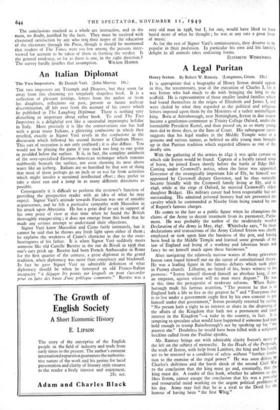An Italian Diplomat
The Two Impostors. By Daniele Vare. (John Murray. 18s.)
THE two impostors arc Triumph and Disaster, but they seem far away from this charming yet singularly shapeless book. It is a collection of pleasant jottings, letters from the author or from his daughters, reflections on past, present or future without discrimination, all left over from the account of his career which he published in The Laughing Diplomat. There is nothing very disturbing or important about either book. To read The Two Impostors is a delightful rest like a successful impromptu holiday in Italy. More precisely it is like the conversations one has had with a great many Italians, a glittering confusion in which they revelled, exactly as Signor Vare revels in the confusione in the discussion which followed his second lecture at Chatham House. This sort of recreation is not only confused ; it is also diffuse. You would not be playing the game if you stuck too long to one point or prodded below the surface. It is, in fact, the complete antithesis of the over-specialised German-American technique which remains stubbornly beneath the surface, not even showing its nose above water like an iceberg. Italians are so horrified by that sort of thing that most of them perhaps go an inch or so too far from activities which might involve a sustained intellectual effort ; they prefer to take a short run and a jump in as many different directions as possible.
Consequently it is difficult to perform the reviewer's function of providing the prospective reader with an idea of what he may expect. Signor Vare's attitude towards Fascism was one of amiable acquiescence, and he felt a particular sympathy with Mussolini in his attack upon Abyssinia. He has a great deal to say in support of his own point of view at that time when he found the British thoroughly exasperating ; it does not emerge from this book that he made any serious attempt to understand their objections.
Signor Vare knew Mussolini and Ciano fairly intimately, but it cannot be said that he throws any fresh light upon either of them ; he explains the weakness of Ciano's character as due to the over- bearingness of his father. It is when Signor Vare suddenly meets someone like old Camille Barrere in the rue de Rivoli in 1938 that one's cars prick up. Barrere had been French Ambassador in Rome for the first quarter of the century, a great diplomat in tht grand tradition, when diplomacy was more than conspiracy and blackmail. In fact he gave Signor Vare an admirable definition of what diplomacy should be when he lamented an old Franco-Italian incapacity "a degager les points sur lesquets on peut s'accorder pour en faire des haws d'une politique commune." Barrere was a
very old man in 1938, but I, for one, would have liked to have heard more of what he thought ; he was at any rate a great lover of music.
As for the rest of Signor Vare's reminiscences, they deserve to be popular in their profusion. In particular his own and his family's delight in all animals takes endearing forms.
ELIZABETH WISKEMANN.


































 Previous page
Previous page